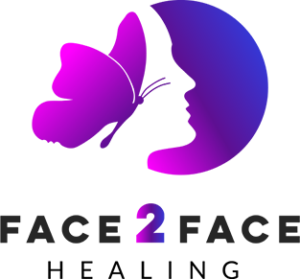Our Lead Counseling Clinician, Dr. Adriane Deithorn, discusses the different types of therapy we offer at Face2Face Healing. There are also helpful tips about finding a counselor and how to determine which style of counseling would fit your situation.
Cognitive Behavioral Therapy (CBT)
Cognitive behavioral therapy (CBT) combines both cognitive therapy and behavioral therapy and focuses on how a person’s thoughts, emotions, and behaviors are interconnected. By identifying the pattern between these three key components, the patient develops an understanding of how his thoughts, emotions, and behavior all influence each other. The patient can pinpoint the destructive thoughts that create negative emotions, which fuel problematic behavior. The patient then learns how to restructure the way he thinks to develop healthier thoughts, beliefs, and behaviors.
Psychodynamic Therapy
Psychodynamic therapy focuses on self-awareness of the patient’s actions and behaviors. Psychodynamic therapy is like CBT in that it works to understand how beliefs, thoughts, behavior, and emotions are interconnected. However, it focuses on the unconscious beliefs and emotions that tend to trigger the negative thoughts, emotions, and behavior, rather than conscious, automatic thoughts that occur in initial reaction to situations.
Humanistic Therapy
Humanistic therapy is a client-centered approach that emphasizes unconditional acceptance from the therapist and the free expression of the patient. With humanistic therapy, the patient is encouraged to openly express what is affecting him as he works with the therapist to find meaning, self-actualization, and understanding of his emotions. Two common humanistic therapeutic techniques are client-centered therapy and Gestalt therapy. Many counselors utilize the client-centered approach’s emphasis on unconditional positive regard or acceptance regardless of other theories they may apply with patients.
Dialectical Behavior Therapy
Mindfulness has become an important concept in human psychology. As you become more attuned to what is happening in the here and now, you can stay better grounded and react more appropriately to any situation. Dialectical Behavior is a relatively new and quite popular form of therapy. It combines this concept of mindfulness with many of the elements of cognitive behavior therapy. In DBT, you learn how to develop stronger relationships, manage out-of-control emotions, and decrease any tendency you might have towards self-destructive behaviors like self-harm.
Choosing the Right Counselor
One of the first things to find out when you’re choosing a counselor is what type of counseling style they use. Finding this information can sometimes take a great deal of effort, especially if you’re considering a counselor in your local area whose website isn’t very informative. A great way to determine the type of therapy they use would be to do an inquiry email or call to ask. From this, you can get an idea of whether that therapist’s style will be right for you and your mental health issues.
The Value of Patience
Your mental health probably won’t improve much at all after your first session with your new counselor, no matter what style they use. Each therapy approach may have different time requirements, your length of treatment will depend on the type of issues you are having. Therapy can last for a couple of months or years, or you may find yourself attending when you feel you need it. If you get impatient and change counselors right away, you might never know the benefits of therapy.
When to Switch Counseling Styles
Patience makes it possible for you to get used to a new therapist and stay long enough to see if their style is best for you. Does this mean you have to stay with one counselor until you feel you no longer need therapy? Of course not! You’re free to switch whenever you like. Assess the counseling you’ve received so far to determine for yourself whether it has been as helpful as you need it to be. Then, decide whether to stay or move on. The counselor will also be paying attention to know whether the style they prefer is working for you. If your counselor sees that they aren’t a good fit for you, they’ll likely refer you to another counselor who is.
Click here to learn more about all of our services.





